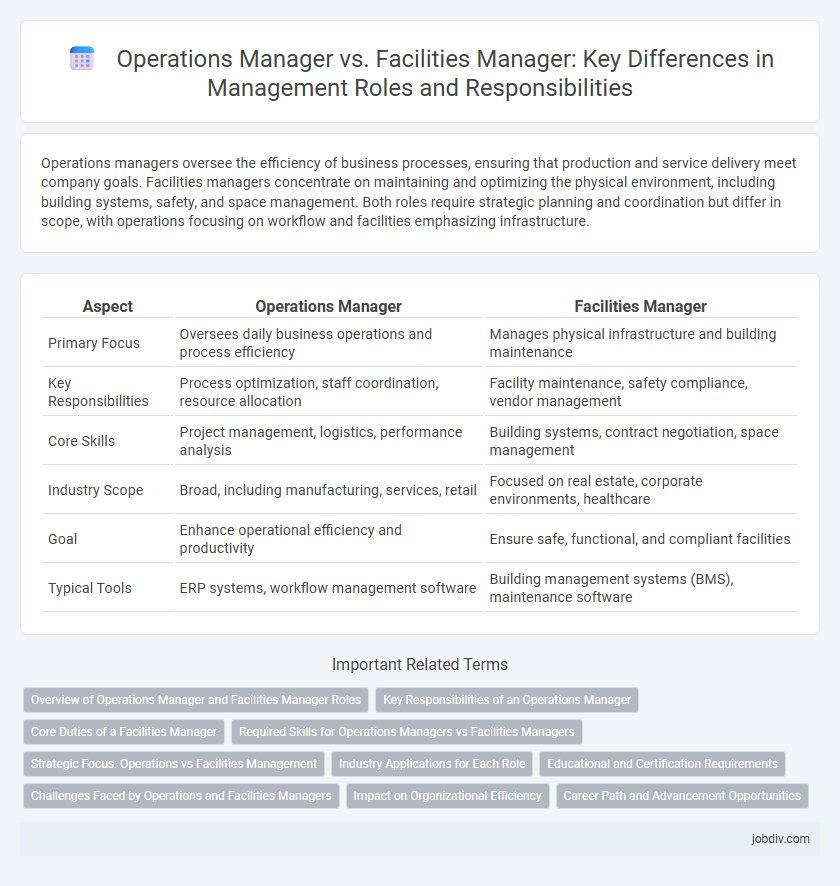Operations managers oversee the efficiency of business processes, ensuring that production and service delivery meet company goals. Facilities managers concentrate on maintaining and optimizing the physical environment, including building systems, safety, and space management. Both roles require strategic planning and coordination but differ in scope, with operations focusing on workflow and facilities emphasizing infrastructure.
Table of Comparison
| Aspect | Operations Manager | Facilities Manager |
|---|---|---|
| Primary Focus | Oversees daily business operations and process efficiency | Manages physical infrastructure and building maintenance |
| Key Responsibilities | Process optimization, staff coordination, resource allocation | Facility maintenance, safety compliance, vendor management |
| Core Skills | Project management, logistics, performance analysis | Building systems, contract negotiation, space management |
| Industry Scope | Broad, including manufacturing, services, retail | Focused on real estate, corporate environments, healthcare |
| Goal | Enhance operational efficiency and productivity | Ensure safe, functional, and compliant facilities |
| Typical Tools | ERP systems, workflow management software | Building management systems (BMS), maintenance software |
Overview of Operations Manager and Facilities Manager Roles
Operations Managers oversee daily business activities, focusing on optimizing production processes, managing supply chains, and ensuring efficient resource allocation to meet organizational goals. Facilities Managers are responsible for maintaining physical infrastructure, including building systems, safety compliance, and space management, ensuring a safe and functional work environment. Both roles require strong leadership and coordination skills but differ in scope, with Operations Managers driving business performance and Facilities Managers focusing on physical asset management.
Key Responsibilities of an Operations Manager
Operations Managers oversee the day-to-day business functions, ensuring efficient workflow across departments such as production, logistics, and customer service. They focus on optimizing processes, managing budgets, and supervising staff to meet organizational goals. Their role involves strategic planning, performance monitoring, and continuous improvement to enhance productivity and operational efficiency.
Core Duties of a Facilities Manager
A Facilities Manager oversees the maintenance, safety, and efficiency of physical buildings and infrastructure, ensuring compliance with health and safety regulations while coordinating repair and cleaning services. Their core duties include managing space allocation, optimizing building systems such as HVAC and electrical, and leading vendor contract negotiations to control operational costs. This role ensures seamless facility operations that support organizational productivity and employee well-being.
Required Skills for Operations Managers vs Facilities Managers
Operations Managers require strong analytical skills, project management expertise, and the ability to optimize workflows to enhance productivity and efficiency. Facilities Managers must possess skills in maintenance management, vendor coordination, and health and safety compliance to ensure a safe and functional physical environment. Both roles benefit from leadership capabilities and excellent communication, but the technical knowledge required differs significantly based on operational scope.
Strategic Focus: Operations vs Facilities Management
Operations Managers prioritize optimizing production processes, supply chain efficiency, and overall organizational performance to drive business growth. Facilities Managers concentrate on maintaining physical assets, ensuring safety compliance, and managing building infrastructure to support operational continuity. Strategic focus for Operations Managers centers on resource allocation and process improvement, whereas Facilities Managers emphasize asset management and environmental sustainability.
Industry Applications for Each Role
Operations managers oversee production processes and supply chain coordination in industries like manufacturing, retail, and logistics to enhance efficiency and output. Facilities managers focus on maintaining physical infrastructures such as office buildings, hospitals, and educational institutions, ensuring safety, compliance, and operational continuity. Each role supports industry-specific goals by aligning resources--operations managers optimize workflows, while facilities managers maintain environments critical to organizational performance.
Educational and Certification Requirements
Operations Managers typically require a bachelor's degree in business administration, management, or a related field, often supplemented by certifications such as PMP (Project Management Professional) or Six Sigma to enhance project execution skills. Facilities Managers generally hold degrees in facility management, engineering, or architecture, with certifications like IFMA's Certified Facility Manager (CFM) or BIFM's Level 4 Diploma providing specialized knowledge in building operations and maintenance. Both roles benefit from ongoing professional development to stay current with industry standards and regulatory compliance.
Challenges Faced by Operations and Facilities Managers
Operations managers grapple with optimizing workflow efficiency, resource allocation, and supply chain disruptions, aiming to maximize productivity while minimizing costs. Facilities managers face challenges in maintaining building safety, managing maintenance schedules, and ensuring compliance with environmental regulations to provide a secure and functional workspace. Both roles require strategic problem-solving skills to address unexpected operational disruptions and align with organizational goals.
Impact on Organizational Efficiency
Operations Managers streamline workflows, coordinate resources, and optimize production processes to enhance overall organizational efficiency, directly influencing profitability and service delivery. Facilities Managers maintain physical assets, ensure workplace safety, and manage infrastructure, which supports uninterrupted operations and boosts employee productivity. Together, their roles create a cohesive environment where efficient processes and well-maintained facilities drive sustainable business performance.
Career Path and Advancement Opportunities
Operations Managers often progress from roles in project management, supply chain, or production supervision, with career advancement leading to senior management or executive positions such as Director of Operations or Chief Operating Officer. Facilities Managers typically begin in maintenance supervision or building services and can advance to Facilities Director or Corporate Real Estate Manager roles, focusing on strategic asset management and organizational support. Both career paths offer growth opportunities, but Operations Managers usually have broader organizational influence, while Facilities Managers specialize in physical environment optimization.
Operations Manager vs Facilities Manager Infographic

 jobdiv.com
jobdiv.com